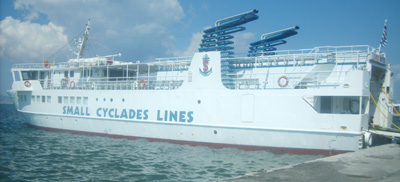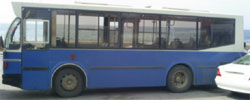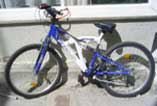Airports and flights
There are airports on many Greek islands. Some can be reached directly by charter flights from Germany. These include Crete, Rhodes and Corfu, for example. But many smaller islands such as Karpathos and Zakynthos can now also be flown to directly from Germany. These days, flights can often be booked more cheaply online than in a travel agency. Prices fluctuate extremely widely. We have flown to Greece for 30 euros, but sometimes flight tickets cost 500 euros or more.
However, many small island airports can only be reached from Athens or Thessaloniki. There are hardly any scheduled flights to the islands from abroad. You have to change planes in Athens. The Greek national airline Olympic Airways flies to almost all of the islands’ airports from Athens. New airlines have been added in recent years. Skyexpress also has many flights between the islands, especially from Crete. Aegian Airlines also competes with Olympic Air on many routes. Domestic flights in Greece are relatively cheap. Many flights have a fixed price that is simply between 40 and 100 euros.
Ferries
 (Small ferry near Naxos)
(Small ferry near Naxos)
No other country in Europe has as many ferry connections as Greece. Around 100 islands depend on regular ferry services. The islands west of the mainland (Ionian Islands) are served by smaller ports on the west coast of the Greek mainland. The islands east of the mainland mostly by Piraeus (the port of Athens), the northwestern ones by Thessaloniki and other ports in northern Greece. Large islands such as Crete, Corfu or the main Cyclades islands are served several times a day, very small ones only once a week. The port of Piraeus is considered the largest ferry port in the world.
➔ To book ferries within Greece, we recommend the reputable website Ferryscanner.com
Still no hotel for your holiday in Greece?There are many thousands of hotels on the islands of Greece. In our opinion, the best overview is available on Booking.com. Here you can sort the accommodations by price or only display accommodations on a specific island. Hotels can be booked quickly and easily on Booking.com, and there are also many holiday apartments. |
Ferry prices have risen in recent years, but are still affordable. A typical 2-3 hour ferry ride costs around 10 euros. Long routes such as Piraeus – Crete or Piraeus – Rhodes cost around 35-50 euros without a cabin. Tickets are available at the port or in many travel agencies without a surcharge. Ferries are sometimes fully booked almost exclusively in the absolute peak season or at Easter. At this time you should buy a ticket a few days in advance. This also applies if you want to take a vehicle with you or want a cabin.
Virtually all ferries that travel at night in Greece have cabins. There are usually 2-bed, 3-bed and 4-bed cabins. You can rent the entire cabin or just a bed in a cabin. If you share the cabin with strangers, the cabin is separated by gender. Tickets with a cabin are around 50-100% more expensive than tickets for a deck passage.
Cars and other vehicles can be taken on all large ferries. This is usually quite more expensive. A car typically costs 2-4 times the price of a deck passage. On long journeys this can be around 100 euros for a one-way trip. Bicycles can often be taken on the ferries for free, and motorbikes are much cheaper than cars.
If you are travelling by car from Germany, it is best to take a ferry from Italy (Venice, Trieste, Ancona, Bari or Brindisi) to Patras. On some ferries the Interrail ticket is valid. The overland route by train or car via Croatia, Serbia and Macedonia or even via Hungary / Romania / Bulgaria is long and tiring.
There are many ferry timetables on the Internet. I use two websites in particular that provide good, clear and up-to-date information. These are www.openseas.gr and www.gtp.gr. If you want to know whether a ferry is currently delayed or if you want to see where a specific ferry is, you should take a look at the website http://www.marinetraffic.com. If you enter the name of the ferry under “Go to Vessel” and then click on the blue highlighted ship name, the current position and direction of travel of the ferry will be displayed on a map.
Bus
 (The buses are blue on many Greek islands)
(The buses are blue on many Greek islands)
There are no railways on the Greek islands. Almost all passenger traffic on the islands is carried by state-run buses. The buses are fast and usually reliable. A 100-kilometer bus ride costs around 8 euros, shorter journeys of around 10 km cost around 2 euros. If you are in a larger town with a bus station, you buy your tickets there in advance. In a smaller town without a bus station, ask for the bus stop and wave when the bus comes. Many buses have a conductor from whom you can buy tickets. If there is no conductor, the driver sells the tickets. Large luggage can be stowed in the trunk, and smaller luggage can be taken on the bus. If you are outside of towns, on some islands you can also stop the bus by waving without a bus stop. You should of course stand in a place where the bus can stop safely. Buses don’t have toilets and smoking is prohibited on buses throughout Greece, although this doesn’t seem to apply to drivers on all islands.
Tip: Here you can find cheap accommodation in Greece that can be booked online
Bicycle

Many of the islands are very mountainous and have small roads with little traffic. This makes the islands very popular with cyclists. Cycling stars such as Team Telekom often train on Crete in the spring. There are several thousand kilometers of roads on Crete, for example: from flat stages to very difficult high mountain tours.
You can rent bikes on many Greek islands. Rental prices vary greatly, but are usually quite cheap. You can often get a bike for just €5 a day.
Others: taxis, rental cars, donkeys, hitchhiking and quads
Until a few decades ago, outside of the big cities, donkeys were almost the only means of transport. Today, there are hardly any left. On my last trip around Crete, I only saw two donkeys in a few days.
Taxis are a bit cheaper than in Germany. A 100 km cross-country trip costs around €80. Greece is a country of taxis. Nowhere in Europe have I seen as many taxis as in Greece. Taxi drivers often pick up other people on the way. This is permitted in Greece. You should definitely agree on a fixed fare beforehand or insist on the taximeter being switched on.
You can rent cars and motorbikes almost anywhere. You should do this on site; it is often more expensive from Germany. However, there are sometimes great deals on the Internet. If you want to pick up your rental car directly from the airport, it is usually better to book in advance. Not all rental cars and two-wheelers in Greece are fully insured. You have to pay close attention to what the contract says. If you have the choice, you should always pay for rental vehicles in cash and not with a credit card. If there is a dispute, you are always in the better position. The rental car company cannot simply charge another sum to your credit card.
Hitchhiking is often easy and somewhat less dangerous in rural areas than in many European countries. You can often get a ride from locals. Some drive very fast, however. Drinking and driving is very common in Greece, and even more so on the islands.
In recent years, so-called quads have become very popular as rental vehicles in tourist areas. These are small, open cars that resemble motorcycles with four wheels. They are much cheaper to rent than cars. However, there have already been several fatal accidents involving quads.
 (This is how taxi is written in Greek)
(This is how taxi is written in Greek)
Great overview of hotels in Greece for the 2025 season
Do you have any feedback, an addition, found an error or a comment? Send us an email to: mail@griechenland-insel.de